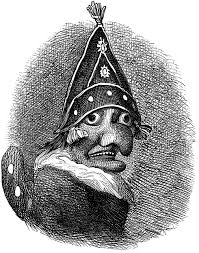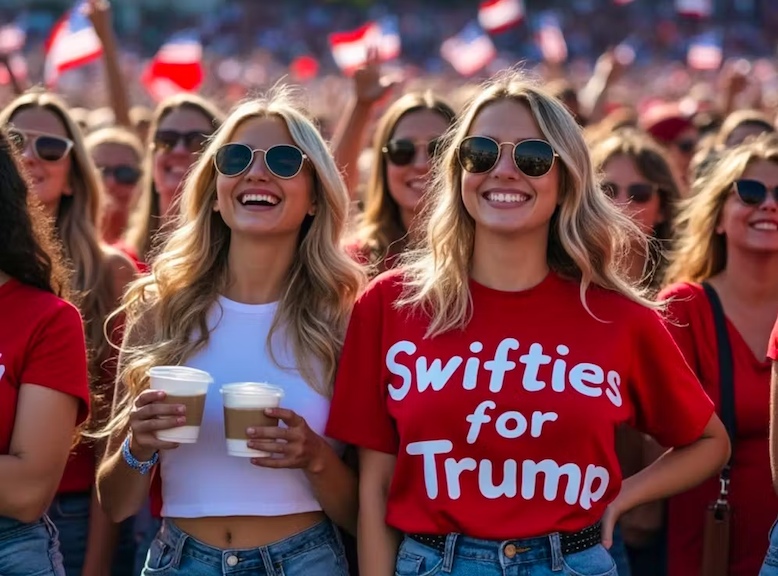August 25, 2024
Artificial Intelligence has arrived at the 2024 U.S. Presidential Election. Donald Trump's return to X last week coincided with his resharing a torrent of AI-generated images, including: Taylor Swift and her fans wearing “Swifties for Trump” T-shirts and her endorsement, “Taylor wants you to vote for Donald Trump.”
“I accept!” wrote Trump, sharing the images along with his reply on Truth Social. In reality, Trump hadn’t been endorsed by Taylor Swift; there is no evidence he’s ever performed a swivel-hipped dance duet with Elon Musk; and we can report with confidence that Kamala Harris did not address a lookalike throng of cartoon communists with a giant red hammer-and-sickle banner looming over the arena at the Democratic National Convention. Because we were there.
And yet… somehow these meme’s self-replicate, mutate, and respond to selective pressures. An Internet meme generator grabs a real image and remixes, copies and recirculates an entirely new and distorted reality which thrives in the grey areas of intellectual property protection. But as Bill Gates points out, "Intellectual property has the shelf life of a banana."
Intellectual Property
As with nearly all original creations, copyright can arise automatically in a newly-created meme provided the content is an original work of authorship; has a minimal level of creativity; and is fixed in a tangible form of expression, according to the National Law Review.
Copyright law gives original creators of memes, or the owners of the media used in the underlying meme, the exclusive rights of reproduction, including — modification, distribution, performance, and display. Therefore, the viral spread of a meme may sometimes constitute infringement of a copyright owner’s rights as the original creation is modified and then displayed, distributed, and reproduced when posted and reposted.
Generally, posting and sharing memes online as a form of expression is not actionable and is usually protected under the First Amendment and the doctrines of fair use. However, when a meme is posted with an intent to profit from the expression, copyright kicks in. Fox Business Network’s Grady Trimble asks Trump, “Are you worried that Taylor Swift is going to sue you?
Trump replies. “I don’t know anything about them, other than somebody else generated them. I didn’t generate them… These were all made up by other people.”
While the U.S. presidential election now hinges on a handful of swing states, undecided voters in Michigan, Wisconsin, Pennsylvania, Nevada, Arizona and North Carolina are turning to voices they know and trust. Whether they’re real or not is immaterial. For the nation, memes are increasingly becoming a material fact.
Frequency Illusion
As AI becomes increasingly mainstream, there is growing concern about how it will influence elections. Potential targets of AI include election processes, offices, vendors, officials and voters.
For example, Trump, sensitive to crowd size, recently claimed that the Harris campaign had used AI generated images to distort the crowd size attending a campaign event in Detroit. “There was nobody at the plane, and she ‘A.I.’d’ it to show a massive ‘crowd’ of so-called followers, BUT THEY DIDN’T EXIST!”
In reality, those pictures were authentic but as former White House Press Secretary Stephanie Grisham observed of her former boss at the DNC, “He has no fidelity for the truth. He used to tell me: 'It doesn’t matter what you say, Stephanie. Say it enough and people will believe you.'"
The Baader-Meinhof phenomenon, also known as the Frequency Illusion, is a cognitive bias caused by an awareness, acceptance, and embrace of information. Two-time Academy Award winner for Best Actress, Jodie Foster explains to James Lipton on “Inside the Actors Studio:”
What is the name on your birth certificate?
Alicia Christian Foster.
How did Alicia become Jodie?
My siblings wanted to name me 'Jodie' when my mother was pregnant, but my mother opted for a family name, 'Alicia.' After I was born, my brothers and sisters never accepted that name, and in sort of a revolt or mutiny only called me 'Jodie.' So, it just sort of stuck.
The phenomenon is caused by selective attention and confirmation bias.
Selective attention is the ability to focus on a particular object or subject while ignoring extemporaneous information. It's also known as controlled attention, directed attention, or executive attention. Confirmation bias occurs when subjective ideas and beliefs re-shape the objective world.
Robocalls
The U.S. Justice Department is challenging robocalls sent by political consultant Steve Kramer, and the three companies involved in transmitting them, to New Hampshire voters that used AI to mimic President Joe Biden’s voice. Assistant Attorney General Kristen Clarke explains:
Robocalls can violate voting rights by incentivizing voters to remain away from the polls; deceive voters into believing false information; and provoke fear among the targeted individuals.
The U.S. Attorney’s Office commends all private citizens willing to stand up against these aggressive tactics and exercise their rights to participate in the enforcement process for the Voting Rights Act.
The FCC has proposed its first AI-generated robocall and robotext rules which will require callers to disclose their use of AI-generated calls and text messages. However, the regulatory process will take years to enforce. Meanwhile, voters should be mindful that false narratives about candidates, issues or venues have been unleashed long before voting ever begins.
To help prevent robocalls, you can register your phone number on the Do Not Call List, which all legitimate telemarketers consult to avoid calling listed numbers. Voters can also select Silence Unknown Callers or Block. Most importantly, never answer a call you don’t recognize as you may be adding yourself to a "hot list" that could lead to even more calls.
While AI generated memes are rife on Facebook, Meta’s Nick Clegg recently spoke at MIT Technology Review's EmTech Digital conference. “AI-generated election content is not happening at a systemic level,” said Clegg, while at the same time defending the company’s decision to publish ads claiming that the 2020 US election was stolen.
Meanwhile, non-commercial, free-to-air terrestrial radio and television operate as publicly funded, nonprofit organizations that serve news and information as a public trust. Consider crosschecking all the fun with NPR or PBS. “By aiming to unite, not to divide, public television might be what saves us yet.”
“The Economist” is tracking the race, and averaging all the polls, which reveals that American's intention at present in the 2024 U.S. presidential race is 48% for Harris, 45% for Trump. Regardless of which dial or side of the aisle you subscribe, we hope this objective fact will help inform your vote, empower your candidates, and align your ideal America with reality.








